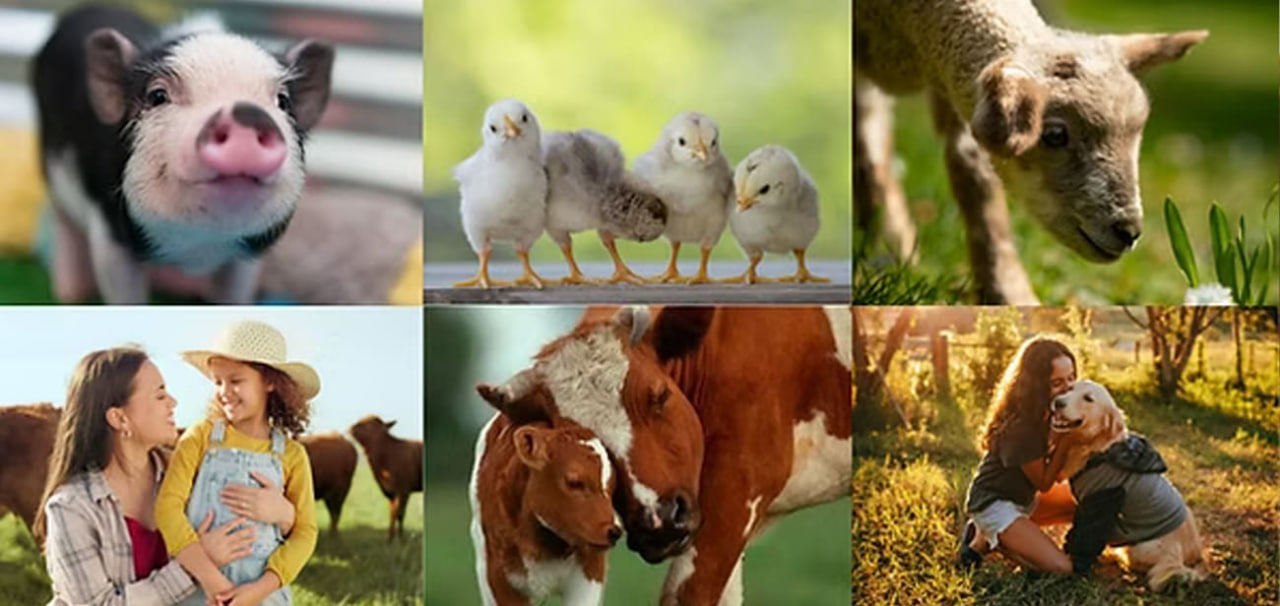Behind Every Bite: The Hidden Toll of Animal Agriculture on Animals, Health, and the Planet
While most of us go about our daily routines, the consequences of what we choose to eat rarely cross our minds. But behind every bite of meat, dairy, or eggs lies a system built on exploitation — not only of animals but also of our bodies, ecosystems, and global resources. Understanding the realities of industrial animal agriculture helps us reframe not only what we eat, but why we eat it.
This article explores the ethical, health, and environmental reasons why millions are turning to a plant-based lifestyle — and how informed choices can protect animals, improve human well-being, and sustain life on Earth.

🐄 Animals in Factory Farms: Suffering in Silence
Billions of animals each year are raised in industrialized factory farms — highly mechanized facilities that treat living beings as units of production. In these environments:
- Cattle and dairy cows are confined, forcibly impregnated, and separated from their young.
➤ Learn more: Cows, dairy, and veal industry cruelty - Pigs are kept in crates so small they cannot turn around. Many mothers never see sunlight.
➤ Learn more: Pig and swine farming abuses - Chickens and turkeys are bred to grow so large, so fast, that many collapse under their own weight.
➤ Learn more: Poultry farming cruelty - Fish, often forgotten in these discussions, are crowded into underwater cages, exposed to parasites, and killed without stunning.
➤ Learn more: Fish and aquatic farming cruelty
These are not isolated incidents — they are standard practices. The sentience of animals is no longer debated; it is scientifically affirmed. They feel fear, pain, joy, and loneliness.
➤ See the science: Animal Sentience
🧬 What This Means for Human Health
Modern science links meat, dairy, and egg consumption with many of today’s most prevalent chronic diseases. For instance:
- Red and processed meats are classified as carcinogenic to humans.
- Dairy has been linked to hormone disruption, acne, and increased cancer risk.
- High-animal-protein diets contribute to heart disease, diabetes, and inflammation.
In contrast, plant-based diets are rich in antioxidants, fiber, and nutrients that protect against disease, lower cholesterol, and promote longevity.
➤ Read more: Nutrition and health on a vegan diet
Shifting to plant-based eating is not about deprivation — it’s about liberation from a cycle of preventable disease.
🌍 Our Planet Is Paying the Price

Animal agriculture is one of the leading causes of:
- Climate change: Livestock emissions contribute more greenhouse gases than all cars, planes, and ships combined.
➤ Learn more: Climate change & emissions - Deforestation: Forests are cleared for grazing and to grow animal feed.
- Water and soil degradation: Animal waste pollutes water sources and destroys fertile land.
➤ Explore: Water and soil impact
Simply put: our dietary habits are incompatible with planetary survival. The current model is unsustainable. But there is hope.
🌱 The Solution Is on Your Plate
Every time you choose plant-based foods over animal products, you are:
✔️ Reducing animal suffering
✔️ Supporting your own health
✔️ Lowering your environmental footprint
✔️ Aligning your actions with your values
Want to start making a change today?
➤ Visit: Vegan Meal Planning and Recipes
➤ Explore: Vegan Shopping Guide
You don’t need to be perfect. You just need to begin.
🧭 Final Thoughts: Eating With Awareness
What we put on our plates may seem like a personal choice, but it ripples across ecosystems, communities, and generations. As awareness grows, so does the global movement toward more compassionate and sustainable living.
Let’s choose to eat with empathy. Let’s nourish not just ourselves — but the world we live in.